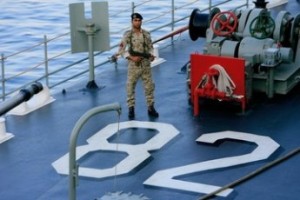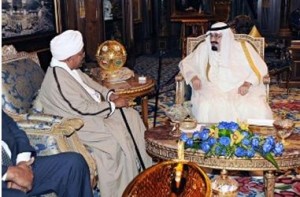In an extraordinary scoop, Sudan Tribune has begun to publish some of the more than 60,000 diplomatic cables from Saudi Arabia released by Wikileaks on Friday, June 19, 2015. The website has said it would release half a million more in the coming weeks.
The texts, all in Arabic, required painstaking efforts to comb through this massive trove in any effort to find those that are of particular significance and specifically about the relationship between Riyadh and Khartoum. At least one cable, signed by the former Saudi foreign minister, speaks to a joint effort by Khartoum and Egypt to assassinate the President of South Sudan, Salva Kiir. This forms part of the context for understanding Khartoum’s present significant military assistance to the rebel Sudan People’s Liberation Army/in Opposition (see http://wp.me/p45rOG-1IU ).
[My editorial comments below appear in italics, in blue, followed by my initials — ER]
[1] Egyptian intelligence coordinated with Khartoum to assassinate S. Sudan’s Kiir: cable | June 19, 2015 (WASHINGTON)
The Saudi embassy in Khartoum informed their government that they have received information on a joint plot by the Egyptian and Sudanese intelligence to assassinate South Sudan president Salva Kiir …
According to one of the cables, the embassy was made aware of three Egyptian intelligence officers who were dispatched by Cairo and … staying in Garden City neighbourhood. The goal [was] to formulate a plan with Sudan’s National Intelligence and Security Services (NISS) to assassinate Kiir and an unidentified number of his aides, the undated cable said. The leaked cable about the joint assassination plot against Kiir was issued by the foreign ministry in Riyadh and addressed to the royal palace. No other details were given in the cable signed by former Saudi foreign minister Saud al-Faisal.
[2] Sudan agreed to Iran request for establishing military base ‘at the right time’: cable | June 19, 2015 (WASHINGTON)
The Sudanese government agreed in principle to establish an Iranian military base, according to a cable released by Wikileaks today….

An Iranian navy special forces known as Takavaran wearing a similar uniform worn by the US military and holding an Israeli made Uzi sub-machine gun stands guard at the Iranian Corvette Admiral Naghdi as it docks in the Red Sea Sudanese town of Port Sudan on October 31, 2012. The visit of two Iranian naval ships to Sudan reflects strong ties between the countries, Sudan’s military said after Khartoum denied Iranian involvement in weapons manufacturing. AFP PHOTO / ASHRAF SHAZLY (Photo credit should read ASHRAF SHAZLY/AFP/Getty Images)
A cable classified as “Secret” with the letterhead “Saudi Arabia – Directorate of General Intelligence” discussed information they received on a request to this effect by the Iranian government. Saudi intelligence said that the head of Iran parliamentary security subcommittee Ala al-Din Boroujerdi sent a letter to the head of the National Intelligence and Security Services (NISS) Mohamed Atta Abbas asking for approval to establish this base.
To discuss this, members of the ruling National Congress Party (NCP) met on May 18, 2012 at the residence of Sudan 2nd Vice President al-Haj Adam Youssef with the presence of presidential assistant Nafie Ali Nafie, NISS director Mohamed Atta Abbas, defense minister Abdel-Rahim Mohamed Hussein, presidential adviser Mustafa Osman Ismail and minerals minister Kamal Abdel-Latif described incorrectly as the justice minister.
[NB: What is especially notable about this part of the leaked cable is that it confirms meetings of the most sensitive and secret nature, involving senior officials of the Khartoum regime, made their way into other hands, in this case the Saudi intelligence service.
This offers further support to the authenticity of the minutes leaked to me by a highly reliable and resourceful Sudanese source; the minutes are for meetings on June 3, 2014, July 1, 2014, August 31, 2014, and September 10, 2014 – ER]
The participants agreed to temporarily close this dossier, the cable says, and not to discuss it and not to present it to other NCP members due to the “sensitivity of the issue.” Ismail was tasked with conveying that they cannot agree to this request at present and “clarifying Sudan’s critical situation” but at the same time expressing their “preliminary approval of this project and postponing talks on this regard until the right time.”
In December 2012, Sudan denied reports that it had given the go-ahead to Iran for establishing a Red Sea naval base, saying it conflicts with government policy.
[NB: The fact that Khartoum felt obliged to deny what it had agreed to in principle also suggests that the discussions at the May 18, 2012 secret meeting did not remain secret: minutes or a summary report of what was discussed must have been leaked – ER]
Since 2012, Port Sudan has become a regular stop for Iranian warships drawing concern by the US and its allies in the Gulf. Khartoum insisted that its relations with Iran are based on common interests and not intended to threaten the interests of the Arab Gulf states. Iran says that in line with international efforts to combat piracy, its Navy has been conducting anti-piracy patrols in the Gulf of Aden since November 2008 to safeguard the vessels involved in maritime trade, especially the ships and oil tankers owned or leased by Tehran.
Israel also accuses Sudan of serving as a hub for weapons coming from Iran that are sent to Palestinian militants. It is believed to have conducted several airstrikes inside Sudan including one in October 2012 that targeted the Al-Yarmouk arms factory in Khartoum.
[3] Sudanese president was angry over reception by Saudi king in 2012: cable | June 19, 2015 (WASHINGTON)
The Sudanese president Omer Hassan al-Bashir was upset by what appeared to be a cool reception by late king Abdullah during a 2012 visit to Riyadh prompting one of his aides to write to Riyadh expressing this displeasure, according to a cable released by Wikileaks.
Photo: Saudi King Abdullah meets Sudan’s president, Omer Hassan al-Bashir, in Riyadh on 9 March 2012
The letter addressed to then Saudi foreign minister Saud al-Faisal from Bashir’s adviser Mustafa Ismail dated April 10 2012 showed Khartoum struggling since late 2011 to establish contacts between Riyadh and Khartoum. “I addressed your highness on December 8, 2011 to set a time to meet your highness in accordance with directions of president Omer Hassan al-Bashir and after the wait went on for so long [to meet Saudi FM] despite repeated phone calls to your chief of staff brother Sultan, brother president [Bashir] decided to visit the Kingdom himself to meet King Abdullah Bin Abdel Aziz may god preserve him,” Ismail wrote.
“But to be honest your highness, I wish the visit did not take place as the president came back frustrated with a different impression than the one he got after every visit [in the past] he made to the kingdom (he was really distressed).” Ismail then asks for a meeting with al-Faisal to discuss this matter further.
The letter by Bashir’s adviser offers a rare glimpse into the strained relationship that existed between the two countries during the reign of late King Abdullah which was attributed to Khartoum’s close ties with Tehran. The Sudanese leader has been unable to meet directly with King Abdullah since this 2012 trip despite repeated visits for pilgrimage or regional events. Bashir has reportedly pushed for financial help from the oil-rich country at that meeting to plug the growing budget hole caused by secession of oil-rich south the year before.
To make matters worse, Saudi Arabia closed its airspace in August 2013 to the plane carrying Bashir on his way to Iran where he was scheduled to attend the inauguration ceremony of then president-elect Hassan Rouhani thus forcing him and his delegation to return home.
But Khartoum may have decided to appease the Arab Gulf state by abruptly shutting down the Iranian cultural center late last year under the pretext of spreading Shiite doctrine. Sudan also joined the Saudi-led military campaign in Yemen after meeting with King Salman in Riyadh last March.
[The conclusion of this last paragraph is certainly true, and reflects the utter desperation of the Sudanese economy, which is now functioning without any foreign exchange currency (Forex)—and thus is unable to import crucial commodities. This has created bread lines and shortages, as well as shortages of cooking fuel and automotive fuel. Food prices are skyrocketing, especially because of the beginning of Ramadan. Many in Darfur are unable to produce food and thus must buy food in markets, driving up prices yet further—for many, to unaffordable levels. The annual “hunger gap” between spring planting and fall harvest has only just begun—ER]
